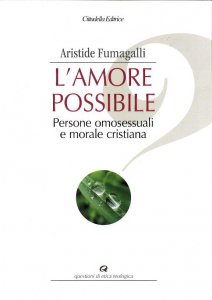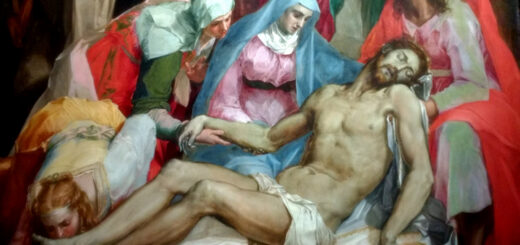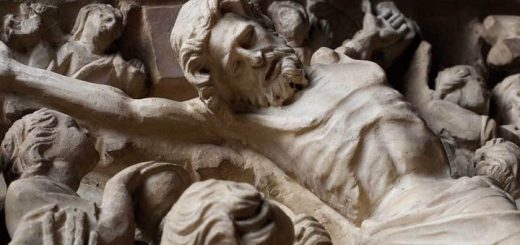The theologian Fumagalli and “The possible love. Homosexual and moral people "
Article by Luciano Moia published in the newspaper Avvenire on October 14, 2020, p.18
"What the doctrine of the Church has always judged negatively is not so much the homosexual person, as homosexual behavior". Although the catechism, reconnecting to the Letter of the congregation for the doctrine of faith, the pastoral care of homosexual people (1986), defines the homosexual orientation "intrinsically disordered", does not refuse the idea that sexual orientation can correspond "to the personal identity of the person, to be in a connatural, so much so that it does not require the change of homosexual orientation".
 Now it is true that the doctrine - as the whole history of the Church shows - is not "monolith set once and for all", but it can be compared "to a building that is renovated to better correspond to its meaning and function throughout history". Which does not mean raising the building on the ground, but treasured its structure and foundations. Even the doctrine on homosexuality can therefore develop in "different continuity" without contradiction and without fossilizing, but "taking on new forms"?
Now it is true that the doctrine - as the whole history of the Church shows - is not "monolith set once and for all", but it can be compared "to a building that is renovated to better correspond to its meaning and function throughout history". Which does not mean raising the building on the ground, but treasured its structure and foundations. Even the doctrine on homosexuality can therefore develop in "different continuity" without contradiction and without fossilizing, but "taking on new forms"?
The response of Don Aristide Fumagalli, professor of moral theology at the theological faculty of northern Italy, is cautiously positive, as emerges from a book published for a few days. Possible love. Homosexual and moral people Christian (Cittadella, Assisi, Pagg.207, Euro 15.90) is a demanding and rigorous text. The preface is by Bishop Marcello Semeraro. The afterword of Giannino Piana.
No slogan, but a rigorous excursus through the doctrine on the topic, from biblical roots to contemporary theological research, to reflect on an objective fact. The moral judgment cannot be abstract but must refer to the concrete condition of people and, in this case, also to scientific results. The condemnation of the acts or homosexuals, explains the theologian, "does not contemplate the possibility, unknown to the contemporary era, that the homosexual acts correspond to the nature of the person and express personal love".
Therefore not acts dictated by "religious idolatry and hedonistic selfishness" - the two conditions that make them unacceptable - but "expression of Christian personal love". Fumagalli starts from a scientific data that cannot be ignored. Today, scholars are largely agreed in considering homosexuality "expression of an existential condition that constitutes and pervades, similarly to internosexuality, the identity of the person".
No arbitrariness and no self -determination behind homosexuality, therefore "but the interaction of biological, environmental and personal factors" that refer to complex factors so "that does not exist from an etiological and structural profile only one homosexuality, but multiple and different homosexuality".
In this inner enigma, so that this condition remains such, the theologian enters into tip of feet, with the respect due to each person regardless of his sexual orientation, in the effort to include whether homosexual love can be said to be interpersonal, respectful of the otherness, fruitful, chaste, responsible and therefore Christianly acceptable so that they are modeled on the love of Christ.
The theologian does not deny the limits of homosexual love in relation to the "structural reduction of sexual otherness" and the "absence of generative fruitfulness" (which can however be compensated, explains, by spiritual, relational and social fruitfulness), but observes that today "a theology more careful to the personal affair considers the path to ideal, recognizing the graduality necessary to fulfill it and the possible intrallci.
Not the abstract idealism of "all or nothing", but the reasonableness of the "best possible". The fruit that this theology has produced in reference to the so -called irregular marriage situations, reads still, "can adequately instruct the moral discernment and the pastoral accompaniment of homosexual people on the path of Christian love"






